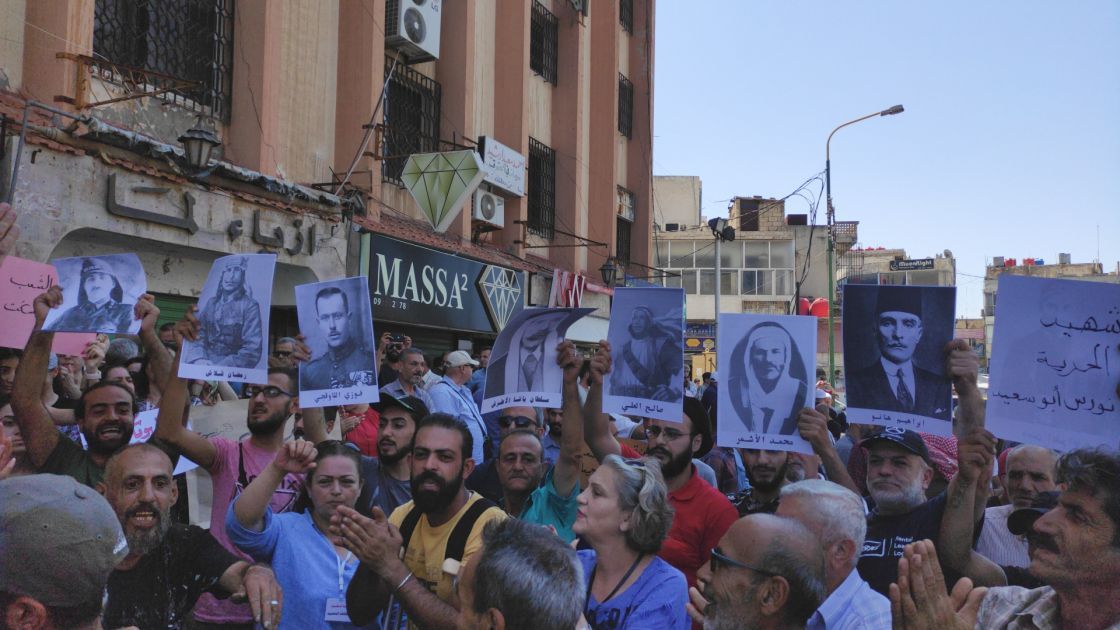- Editorials
- Posted
Kassioun Editorial 1140: Peacefulness is the Demands’ Shield and Guarantee
The strength of any popular movement lies in its collectivism and its ability to organize itself, and the peacefulness of any popular movement is always its most important and strongest protective shield, and one of the most important guarantees of it reaching its final goals.
This applies to all cases of popular movement, and implicitly applies to the Syrian case, and perhaps applies to it more than it does to others. The previous bitter experience that Syrians went through proves that all those who pushed towards violence and weapons – whether under the slogan of “protecting demonstrations” or under the slogan of “militarily defeating the conspiracy” – were, in essence, taking the same position from the popular movement, which is the position of its enemy that wants to end it or exploit it to achieve its narrow interests, not the interests of the popular movement.
In any case, what was and still is common among the extremists from the Syrian sides, is their rejection of the popular movement’s gradual and peaceful development. This is because giving the movement enough time to develop not only allows its ranks to be organized on national and rational basis, but also allows its slogans to be strongly rooted economic and social ones, and also allows isolating those who try to sabotage it from within.
Among the lessons that people have learned and are learning and paid for with blood and pain, is that maintaining peacefulness is not just a slogan that is repeated, but rather a practice that requires diligent work on several things in parallel:
First: Verbally adhering to peacefulness, i.e., through slogans and chants, is a necessary condition for maintaining peacefulness and subsequently the movement. However, it is certainly not a sufficient condition.
Second: Maintaining peacefulness requires working to prevent any adventurous behavior of the type that small groups are carrying out, and for which the entire movement is being held responsible. If the movement cannot prevent adventurous behavior, then it must disclaim it and work on isolating it socially and politically.
Third: Maintaining peacefulness also requires people on the ground not to let anyone to hijack representing them, as happened previously. Implicitly, no one individual or group, whoever they may be, should be allowed to establish themselves as leaders or representatives of the movement. The process of reaching true political representation of any popular movement is one that should take its required objective time, and must be done on comprehensive national basis, and not on regional basis. Within this process, people sort out their leadership through trial, through doing what is right and making mistakes, and through accumulating confidence in words and actions. Anyone who is quick to present themselves as a leader of the movement, whether political figures or forces, should be aware that those who carried this out previously are being insulted in the streets today, and the fate of those who imitate them will be no different. True patriots and revolutionaries must be humble and rational, and respect the people’s ability to choose whoever they want. All of this falls within the framework of peacefulness, because accepting, even formally, some “leadership” of the movement, one that is trying to impose itself from above, means surrendering the fates of the people to it, and it means allowing that “leadership” to take risks according to what it deems appropriate, including dragging people towards risks to the peacefulness of their movement.
Fourth: Peacefulness gets its strength from its humanitarian, moral, and constitutional legitimacy, but it also gets its strength from its ability to assemble those who are sympathizers, hesitant, and fearful. Therefore, the mutual relationship between peacefulness and expanding the ranks of the popular movement, which cannot be tangibly achieved without correcting the slogans by primarily focusing on the political solution through UNSC Resolution 2254, and by ending disrespect for the people’s just economic and social demands, but rather by adopting and raising them as a radical and essential part of the emergence of any popular movement and its ultimate goals.


